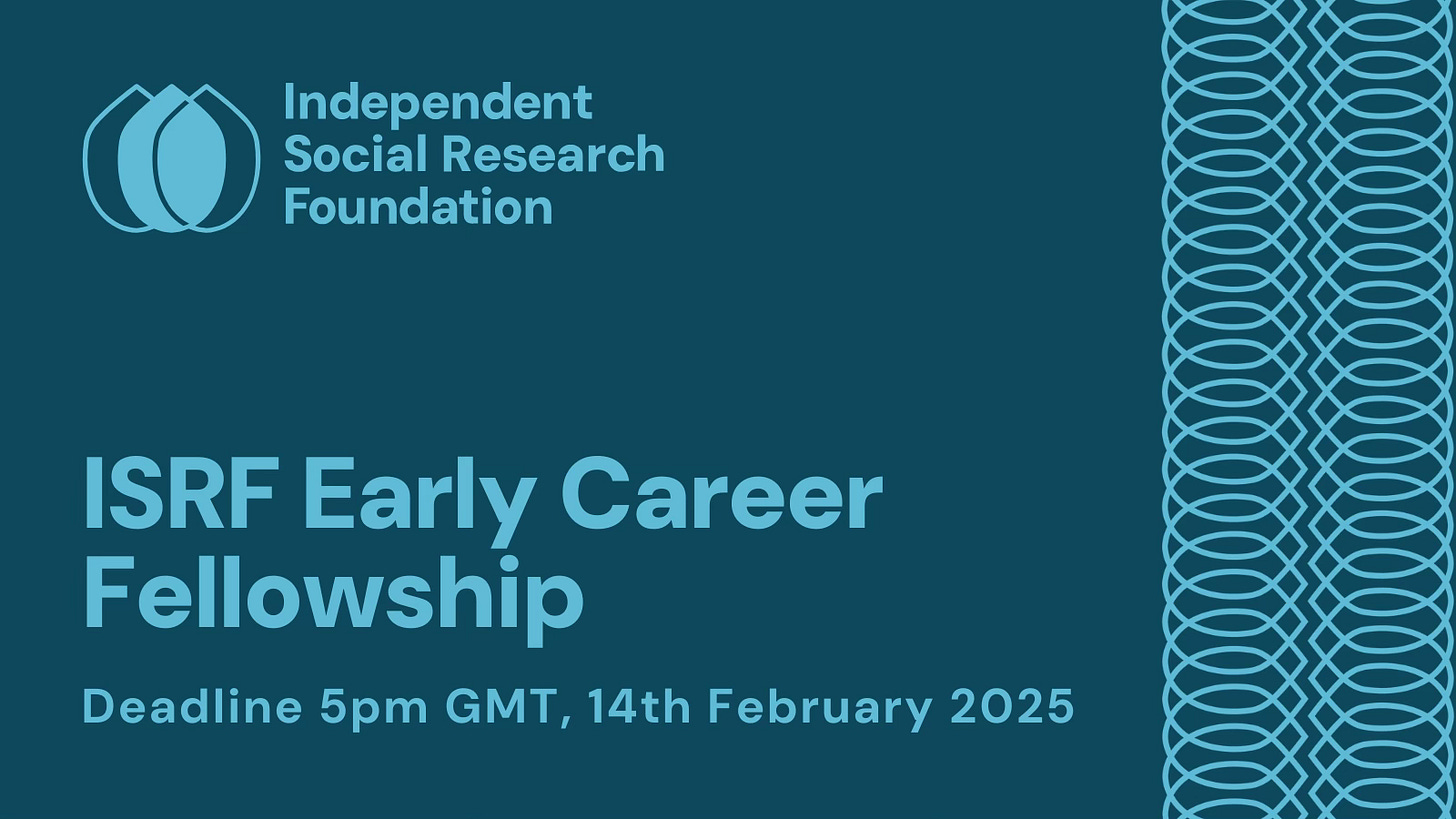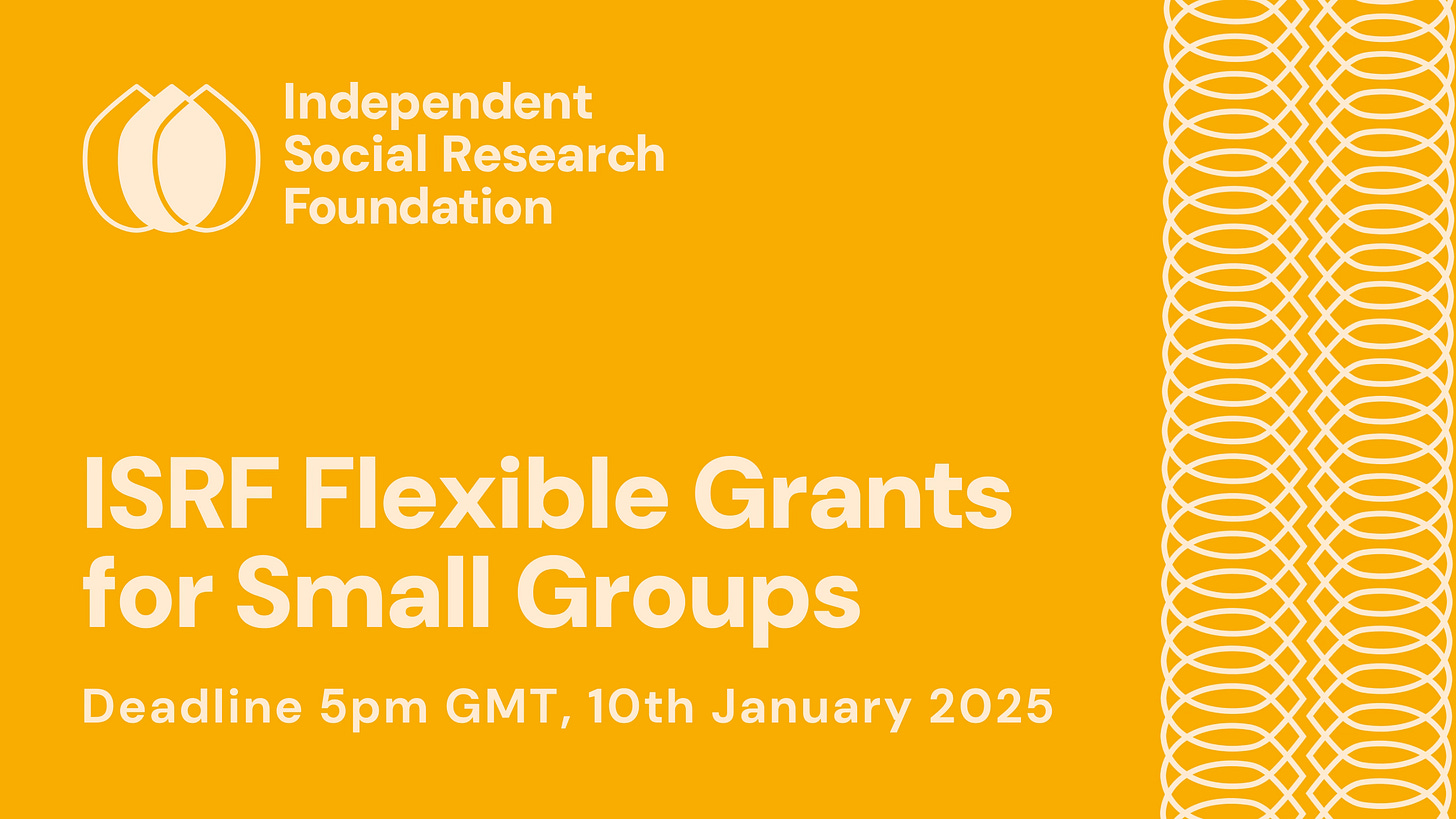Early Career Fellowship Competition – Launch Announcement
The ISRF has launched its eighth Early Career Fellowship competition. Deadline for applications: 5pm GMT, 14th February 2025.
ISRF Early Career Fellowship Competition
The Independent Social Research Foundation wishes to support independent-minded researchers to explore and present original research ideas which take new approaches, and suggest new solutions, to real world social problems.
Scholars from within Europe (inc. UK) are eligible to apply. Candidates should be within 10 years of PhD award at the time of application. Career breaks may be taken into account. Applicants will normally hold a full-time or part-time salaried position – which may be permanent or fixed-term – at an Institution of Higher Education and Research. However, independent scholars or individuals not currently in an academic role may also apply.
The awards are intended as providing full relief from all teaching duties and all associated academic administration for a period of up to one year, and must commence no later than end of January 2026.
The amount of an award depends on the nature of the work proposed and individual circumstances – the ISRF expects applications for grants up to a maximum of €81,500 (or £67,500 for UK-based applicants). Within that sum, reasonable support for research expenses may be considered on a matched-funding basis with the host institution.
Eligible Research
The ISRF aims to fund innovative research which breaks with existing explanatory frameworks so as to address afresh empirical problems with no currently adequate theory or investigative methodology. Innovation may also come from controversial theoretical approaches motivated by critical challenge of incumbent theories. Interdisciplinarity in the generation of new investigative initiatives may be achieved by combining, cross-fertilising, and so transforming empirical methods and theoretical insights from the social sciences. Projects ranging across the breadth of the social scientific disciplines and interdisciplinary research fields are welcome, and relevant applications from scholars working within the arts and humanities are also encouraged.
Applicants should consult the Criteria as set out in the Further Particulars and show that they meet them. Applicants are expected to submit their complete application electronically via the online application system, in English.
Closing date for applications is 5pm (GMT) on 14th February 2025.
Also…
ISRF Flexible Grants for Small Groups Competition
The Independent Social Research Foundation wishes to support independent-minded researchers to explore and present original research ideas which take new approaches, and suggest new solutions, to real world social problems. Such work would be unlikely to be funded by existing funding bodies.
The Foundation intends to award on a competitive basis, to candidates of sufficient merit, a number of grants providing flexible support (for instance: relief from teaching and/or administration, research and travel expenses, fieldwork and practical work) for a period of (up to) one year for the activities of a small research group.
The awards are intended as enabling one or more short periods of face-to-face joint group work such as workshops, working-in-pairs, or short academic visits over a period of up to one year, and must be taken up (i.e. commence) no later than end of December 2025.
Scholars from within Europe are eligible to apply as Principal Investigator(s) to lead a small group of 2-10 scholars (which may include graduate students). Principal applicants should hold a PhD and will normally have a permanent appointment at an institution of higher education and research. Applications may be made by those whose sole or principal post is part-time equivalent. Independent scholars with an academic affiliation may also apply.
Eligible Research
The ISRF is looking for innovative research that breaks with existing explanatory frameworks so as to address afresh empirical problems with no currently adequate theory or investigative methodology. Innovation may also come from controversial theoretical approaches motivated by critical challenge of incumbent theories. Interdisciplinarity in the generation of new investigative initiatives may be achieved by combining, cross-fertilising, and so transforming empirical methods and theoretical insights from the social sciences. Projects ranging across the breadth of the social scientific disciplines and interdisciplinary research fields are welcome, and relevant applications from scholars working within the humanities are also encouraged.
Award Value
The amount of an award depends on the nature of the work proposed and individual circumstances – the ISRF expects applications for grants up to a maximum of €8,500 (or £7,100 for UK-based applicants).
Applicants should consult the Criteria as set out in the Further Particulars and show that they meet them. Applicants are expected to submit their complete application electronically via the online application system, in English.



